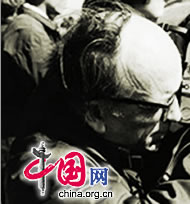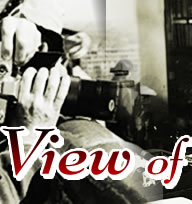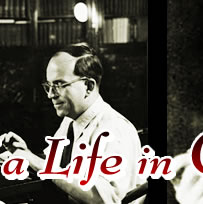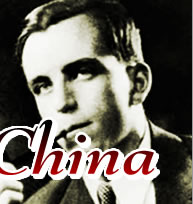By Zhang Yan
IN my life I have made many friends, both Chinese and foreign, quite a number of them intimate to the extent that I can repose in them my full confidence. Israel Epstein, known as Eppy to his friends, is one of the most outstanding. In appearance he is foreign, but emotionally he is Chinese, having taken Chinese citizenship in 1957. Those who have heard and read his analyses on Chinese issues are impressed with his deep insight. Epstein, who turns 90 on April 20, is a living witness to the radical changes that have occurred in the past century. His numerous books on China occupy a special place in the treasure house of Chinese history.
Having become initially acquainted with Epstein's work through his reports on the anti-Japanese war, I met him for the first time in mid-summer of 1951. Epstein and his wife Elsie Fairfax-Cholmeley came to China from the United States via Europe at the invitation of Soong Ching Ling. Chen Hansheng, the famous scholar who was at that time making preparations for the founding of the English-language monthly magazine China Reconstructs, went to meet them at Qianmen Railway Station. In my capacity as editor of People's China magazine, which Epstein was also invited to work on as polisher, I was part of the welcoming committee. Although we had never met before, the three of us felt like old friends on this first meeting. For the half-century that followed we occupied an important place in one another's lives.
For a time we lived in a siheyuan, our rooms in opposite wings facing each other, so we became good neighbors. As my desk was next to Eppy's in the office, we often exchanged views. During the "cultural revolution' (1966-76) Eppy and his wife were framed as "international spies" and imprisoned in Qincheng Prison in Beijing's suburbs. I was also tortured and interrogated at this time. When it ended, I sat together with Eppy again in the same office, bathed in the spring breeze of reform and opening, as we worked together to rejuvenate our magazine. This was the happiest and most creative period in my career. To my mind, Eppy is both a bosom friend and wise helpmate. It is thanks to that I became a good journalist.
Generally speaking, the function of a foreign polisher is to improve translations for the benefit of foreign readers, but Eppy went far beyond this. Versatile and experienced, he is familiar with Chinese history and also the situation in other countries. His polishing makes an ordinary article convincing, appealing and interesting to anyone. Since reform and opening, China's status in the international community has risen, and Eppy's concern for China's international communications elevates the magazine's content to one encompassing national issues.
In addition to talking, writing and getting online, Eppy is always reading some journal or book, his thirst for knowledge constant. His assiduous habits have been inspirational as they make clear to me that it is impossible to be a good journalist without being diligent and constantly expanding one's knowledge. The success of a journalist relies to great extent on "a good grounding," which, in turn, is based on diligence.
Constant improvement is Eppy's guiding principle. No matter what the article, he can always find a way of changing it for the better. This habit is not always well received. Some co-workers have said that changes at the last stage of the printing process create problems for printing workers, but everyone acknowledges that they are always an improvement.
Working "hands-on" is another of Eppy's characteristics. During the time he served as editor-in-chief he often went out to conduct personal interviews. His aim was not merely to write, but to be aware of what was actually going on in society, and to experience first-hand the conditions in which the masses lived. He would also visit the United States and Europe every two years or so in order to be aware of new situations, especially as regards international response to China's progress. Each time he went abroad Eppy brought back large quantities of information, and, most importantly, suggestions on how to improve China's international communications.
As a journalist and writer, Eppy has published countless articles worldwide. Since his first book, The People’ War, published in London in 1939, he has published more than a dozen others, each of which has historic value by virtue of the pains he took to write them. When writing his book Tibet Transformed, he visited Tibet four times and interviewed hundreds of people, as well as reading all the books by foreign authors on Tibet he could find in the national library. Eppy spent a decade on the biography Woman in World History -- Soong Ching Ling that Mme Soong personally authorized him to write. In his author's preface Eppy wrote, "The aim of this biography is to have the reader meet her face to face. Wherever possible, her story is told in her own words, drawn from her available writings, including numerous letters. Moreover, it is my first attempt at biographical writing, and seventy-plus is not a good age for a beginning. But I have done my best."
Eppy has formed an indissoluble bond with China's revolutionary leaders. From their Yan'an cave dwellings, Mao Zedong, Zhu De and Zhou Enlai actually mapped out the course of his life, and his long-term cooperation with Soong Ching Ling has had obvious influence on his career. On Eppy's 70th birthday, Deng Xiaoping and Deng Yingchao personally went to congratulate him. Hu Yaobang, then general secretary of the Central Committee of the Communist Party of China, wrote in his letter of congratulations: “During the ten-year calamity you suffered great injustice, but your love and trust for the Communist Party of China and the Chinese people have never wavered. You have proved yourself a staunch internationalist fighter and patriotic citizen."
On his 80th birthday, then top leaders Jiang Zemin and Li Ruihuan attended his birthday party, but this did not inhibit him from criticizing China's foreign publicity work in his speech. The next day, the People's Daily published his special birthday party address. Last year, on Eppy's 89th birthday, Premier Wen Jiabao visited his home to congratulate him, and also to solicit his opinions on government work.
Zhang Yan is the former first deputy editor-in-chief of China Today.
(China Today April 2005)







